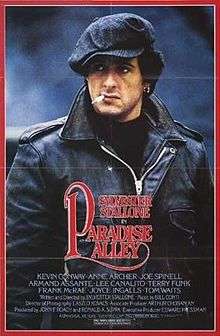Paradise Alley
| Paradise Alley | |
|---|---|
 | |
| Directed by | Sylvester Stallone |
| Produced by | Edward R. Pressman |
| Written by | Sylvester Stallone |
| Starring |
Sylvester Stallone Kevin Conway Anne Archer Joe Spinell Armand Assante Lee Canalito Terry Funk Frank McRae Joyce Ingalls Tom Waits |
| Music by | Bill Conti |
| Distributed by | Universal Pictures |
Release dates |
|
Running time | 107 minutes |
| Country | United States |
| Language | English |
| Box office | $7,185,518 (US)[1] |
Paradise Alley is a 1978 American sports film written and directed by Sylvester Stallone in his feature film directorial debut, who also starred in the role. The film tells the story of the three brothers in Hell's Kitchen, New York City in the 1940s who become involved in professional wrestling.
This was the first major film in which Armand Assante appeared. Anne Archer also starred. Joe Spinell, a co-star of Rocky, played the wrestling MC.
A number of professional wrestlers appeared, including Terry Funk as the foil to the hero. Cameos include Ted DiBiase, Bob Roop, Dick Murdoch, Dory Funk Jr., Don Leo Jonathan, Don Kernodle, Gene Kiniski, Dennis Stamp, Ray Stevens, and Uliuli Fifita. Playwright and screenwriter John Monks Jr appeared as Mickey the bartender.
Plot
Victor, the youngest and largest of the Carboni brothers (Cosmo and Lenny are the other two), becomes a local wrestler (named Kid Salami) at the request of Cosmo, who thinks there is big money to be made.
Lenny agrees to manage his career. They look to Victor to win enough matches so they can get out of Hell's Kitchen for good. (Victor wants to marry his Asian girlfriend and live on a houseboat they plan to buy in New Jersey.)
Each brother has his own style. Cosmo is a hustler and con-artist, always looking for the next easy buck. Lenny is the former war hero, now an undertaker who came back to the neighborhood with a limp and a bitter attitude. Victor is a gawky, strong, dumb yet sincere hulk of a man, who leaves his job hauling ice up tenement stairways once he is persuaded to become a wrestler.
Initially, it is Cosmo that dominates the proceedings, aggressively encouraging Victor to wrestle against the wishes of his girlfriend. Lenny is at first unsure of all this, and constantly tries to warn off Victor, reminding him that he could get hurt.
As the story progresses, the roles begin to reverse. Cosmo becomes concerned for Victor's welfare and feels guilty about getting him into this while Lenny becomes ever more keen to exploit Victor as far as he can. Lenny seems to undergo a complete personality change, losing his cool demeanor and becoming an aggressive, manipulative high roller.
In the end, Victor wins a big wrestling match in a rainstorm and the brothers are reunited.
Cast
- Sylvester Stallone as Cosmo Carboni
- Armand Assante as Lenny
- Lee Canalito as Victor
- Anne Archer as Annie
- Kevin Conway as Stitch
- Terry Funk as Frankie the Thumper[2]
- Frank McRae as Big Glory
- Joe Spinell as Burp
- Tom Waits as Mumbles
- Aimee Eccles as Susan Chow
- Joyce Ingalls as Bunchie
- John Cherry Monks, Jr. as Micky the Bartender
- Frank Stallone as Singer
- Ted DiBiase as Wrestler
Production
Sylvester Stallone wrote the story as a novel then a screenplay before he wrote Rocky. He later recalled:
I was very broke and I optioned the screenplay of PARADISE ALLEY to a real… how should I say this… maggot, who put his hooks in so deep I could never get it away from him. So the first time I went in to meet Chartoff and Winkler, I was there on an acting job. I didn’t get it, but on the way out I said, “I have this screenplay called PARADISE ALLEY.” They said to bring it over and I did. They wanted to make it, but the other cretin that I had optioned it to was so obnoxious, so overbearing, that the producers wanted nothing to do with me or the screenplay. So on the way out, they said, “If you have any ideas, we’d be happy to look at them.” That night I went home - even a fire extinguisher couldn’t cool the burning in my brain. The door of opportunity was wide open and I had nothing to carry over its threshold. That’s when I started to write ROCKY. So thank God for the maggot; otherwise I never would’ve written the story of Mr. Balboa.[3]
In interview with Roger Ebert in 1980, Stallone mentioned that Paradise Alley was originally much longer film before he was forced by Universal Pictures to cut it down. Stallone said; ""I'll never forgive myself for the way I allowed myself to be manipulated during the editing of that film. There were a lot of scenes in there to give atmosphere and character, and they wanted them out just to speed things along. They removed 40 scenes, altogether. I put 10 of them back in for the version shown on TV. For example, the whole sequence of the soldier without legs, sitting on a bar eating peanuts." The same type of studio interference and forced big cuts on the film also happened to the next movie he made for Universal, Nighthawks (1981).[4]
References
- ↑ "Paradise Alley". Box Office Mojo. Retrieved July 24, 2011.
- ↑ Fin Martin and Antohy Evans (August 2003). "Know their Roles". Power Slam Magazine. Lancaster, Lancashire, England: SW Publishing Ltd. pp. 26–31. 109.
- ↑
- ↑ http://www.rogerebert.com/interviews/interview-with-slyvester-stallone